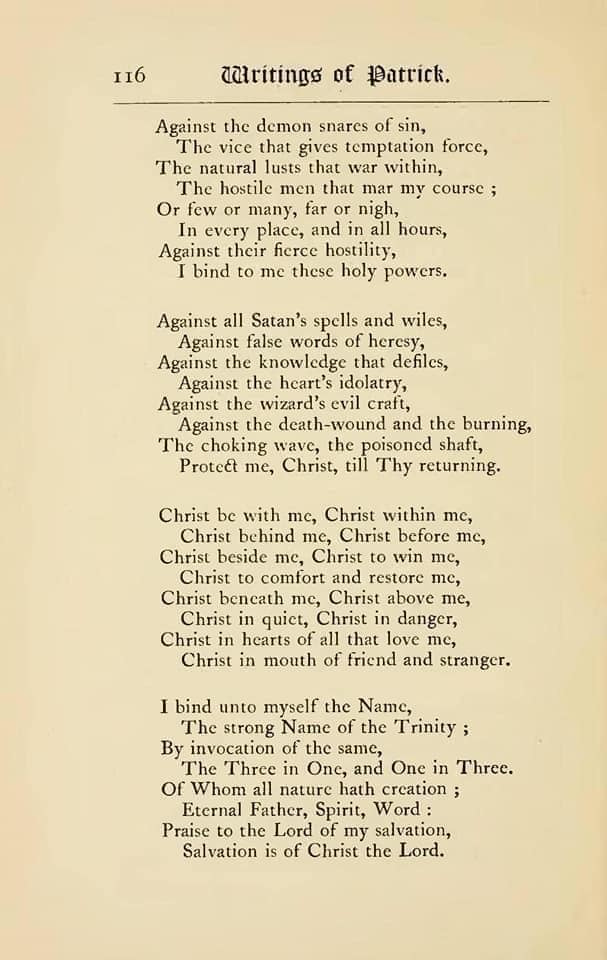Welcome to The Square Inch, a Friday newsletter on Christianity, culture, and all of the many-varied “square inches” of God’s domain. This publication is free for now, but please consider clicking on the button at the bottom to become a paid subscriber to enjoy this along with Monday’s “Off The Shelf” feature about books and Wednesday’s “The Quarter Inch,” a quick(er) commentary on current events.

Dear Friends,
Happy Saint Patrick’s Day!
It is a rather odd day, isn’t it? What is it about this particular saint and his Feast Day that has everyone wearing green and trying out their lousy Irish accents? I can only think of one other saint who has this kind of commercial appeal: Valentine.
And since the popularity of Valentine’s Day is fueled by romance and chocolate, I figure that Patrick is celebrated as the excuse to drink a lot of Guinness.
Which is too bad. Well, I mean, Guinness is good, but that shouldn’t be the sole reason for the celebration. Patrick was a great saint and missionary and it would be worthwhile, I think, to celebrate him for who he was and what he actually did. He was a staunch Trinitarian (keep in mind this was not far removed from the great trinitarian controversies of the 4th century—it shouldn’t be taken for granted that Patrick was one of the “good guys”) and he was a fearless missionary to Ireland, an island that was pretty much the opposite of the “Emerald Isle” we think of today. It was dark, violent, and pagan. Through his ministry he really did drive the snakes out of Ireland—if by “snake” you mean paganism, which always uses serpents as a symbol in honor of their true Father, the original Serpent of the Edenic narrative.
One of the things I somewhat regret about my upbringing in a small Reformed community is a vague sense of guilt in celebrating things like St. Patrick’s Day. You see, it was always viewed as a “Roman Catholic” holiday and we didn’t really go in for that kind of superstitious nonsense. And I guess that is understandable. Ireland is a Roman Catholic country, and the celebration of her “Patron Saint” is most obviously associated with that church. It didn’t help that the big Roman Catholic Church downtown was called “St. Patrick’s.”
It took me a very long time—way too long—to figure out that the Roman Catholic Church is bluffing in its claim on Saint Patrick. After all, in the 5th century there was only one church, and Rome’s claim to be the sole ecclesiastical heir of that era is precisely what needs to be—and cannot be—proved, and precisely the claim the Reformers convincingly disputed. In reality, Rome has no greater claim on Patrick or the broader theological tradition than the Reformed.
You see, it turns out that my problem was that I was not nearly Reformed enough. It wasn’t really until seminary that I began really noticing that the Reformers—Luther, Calvin, etc.—all revered the early church fathers and claimed them as their own. Calvin in particular was an expert on St. Augustine; he ran rings around his Roman Catholic opponents by citing him and many others. The Reformers, in other words, were not breaking from the early church, they were seeking to restore and recover what had been obscured, forgotten, or disfigured. They were not revolutionaries. They believed themselves to be in continuity with the early church.
But somehow, for some reason, at the practical level people in Reformed circles think of everyone prior to the 16th century as “Roman Catholic.” That is a really basic mistake that, as I say, took me a long time to recognize. It’s also characteristic of the radical Anabaptist wing of the Reformation. Patrick, along with all the other great trinitarian stalwarts like Athanasius or the Cappadocians, belong to all Christians. They are our heritage. Our fathers in the faith.
If you’d like to read an accessible series of essays along these lines, I very much enjoy Aaron Denlinger’s four-part series on Calvin’s argument with Trent on the doctrine of Scripture. There isn’t a page that links all of the posts, so I’ll do it here:
So yes: I, as one squarely embedded in the Reformed tradition, have no trouble whatsoever celebrating Saint Patrick and his missionary success in Ireland in the 5th century. After all, he was a missionary of my church.
You know what else was my church? The church that produced the early ecumenical creeds—the Apostles, Nicene, and Athanasian. I bring this up because of all the recent unpleasantness regarding Gary DeMar and his organization, The American Vision. Having been publicly called out for their departure from orthodox creedal Christianity, they now call for a “new council” on matters of eschatology.
Excuse me? We have already had councils that spoke definitively on matters of eschatology: the creeds I just listed. And these councils set the outer boundaries of what Christians must believe about the End Times—the bodily Second Advent of Christ, the bodily resurrection of the dead, and the final judgment. And The American Vision wants to revisit these issues. Why? I can only conclude it is because they want to move the tent pegs so that it includes them.
Christianity is a pretty big tent already, and there is no room for anyone who cannot ascribe to those three basic truths. I am saddened at this tacit admission that they are, in fact, outside the camp of orthodox Christianity, but it is helpful to know.
And I also note how quickly Gary DeMar went from “how dare you question me!?” “I am just asking questions,” “I’m still studying these matters,” to something akin to “You’re d— right I’m a heretic!” Disingenuous from the start.
Please pay no further attention to him or to The American Vision.
Pay attention, rather, to Patrick and the whole cloud of witnesses who embrace and confess the faith once for all delivered to the saints, who anticipate the Lord’s coming again in glory to judge the living and the dead, and who look forward to the resurrection of the dead and the life of the world to come.
Thank you for reading The Square Inch Newsletter! Have a wonderful weekend.






I just read ST. Patrick of Ireland: A Biography by Philip Freeman (Simon and Schuster, 2004) and learned so much from it about this man. I want to be like him. God talked to him. Do you remember singing "Hymn of ST Patrick" at Rocky 1990s? I'm wanting to sing it at my church here in Portland on Sunday. The Music Director came over and did the accompaniment for me yesterday. Thank you for writing this.
You should put that one to music! I would love to sing it!